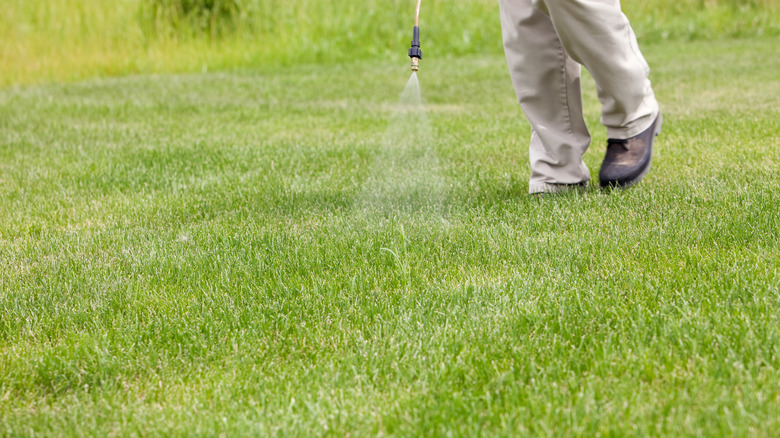Grubs — hungry young beetles that haven’t taken the shape of a beetle just yet — may be small, but they can do a lot of damage to your lawn, as they live in the soil and munch on plant roots. When grubs call your lawn their home, the grass is likely to be badly damaged or destroyed, depending on how many are infesting your yard. Getting rid of them as soon as possible is crucial to keeping your yard nice and pretty, but some insecticides could harm beneficial insects or the grass itself. Neem oil is a natural alternative to insecticides that has insecticidal properties, making it an effective choice.
You’ll know you have a grub problem when your lawn slowly starts to die back and thin out in late summer, and the grass pulls up easily. Dry soil or other problems may cause similar symptoms, but the grass likely won’t be as easy to pull up if something else is the issue. Look for grubs in the top 2 inches of soil in the affected area; they’re usually white and curled up in a “C” shape. But how does neem oil combat these irksome pests?
Using neem oil as a horticultural oil

Horticultural oils are refined pesticides made from petroleum or plants. Neem oil is extracted from the neem tree and is used to kill and repel pests and prevent fungal diseases. It can be used as a horticultural oil to kill pests via suffocation, or it can be used as an insecticide. The specific application will determine which kind of neem oil to buy. Clarified hydrophobic extract of neem oil is the kind that has the natural insecticide chemical removed during processing.
When used for smothering, it works best on soft-bodied insects such as grubs. It coats the grubs in oil and causes them to suffocate and die before they mature and develop a protective exoskeleton. Applying this oil to your yard is easy: Simply follow the directions on the neem oil package and apply it to your yard accordingly. Some products are sold pre-mixed and ready to use, while others must be diluted with water before spraying. Even though neem oil is plant-derived and natural, it can harm your grass if misused. Horticultural oils can burn plants due to phytotoxicity, so this is not a case where you should skip the directions!
Using neem oil as an insecticide
The other way to use neem oil is as an insecticide. The clarified hydrophobic variety won’t work for this; you’ll need the kind that contains azadiractin, a natural chemical with low toxicity to mammals which is an effective way to kill insects. This is called extracted neem oil and will have azadiractin on the label, and may be labeled as “pure” or “cold-pressed” neem oil. You can use it as you would the other kind; just follow the package directions. However, it should be noted that it can harm bees and other pollinators if they come into contact with the oil. You can avoid this by not spraying where pollinators are active or waiting until the evening hours after most pollinators are finished for the day.
Azadiractin kills insects that lack an exoskeleton, making it effective against grubs. It repels the larvae but also causes some damage when consumed by inhibiting their growth. Since they stop growing, they’re unable to reach their pupae stage and won’t develop into reproducing adults, which brings the multiplication of grubs and beetles to a screeching halt. Azadiractin behaves as a systemic, which means it may be absorbed by plants and can harm insects that eat the leaves or roots. Since grubs munch on roots, they’ll have a second chance of getting harmed by it if they don’t come into contact with the oil itself.